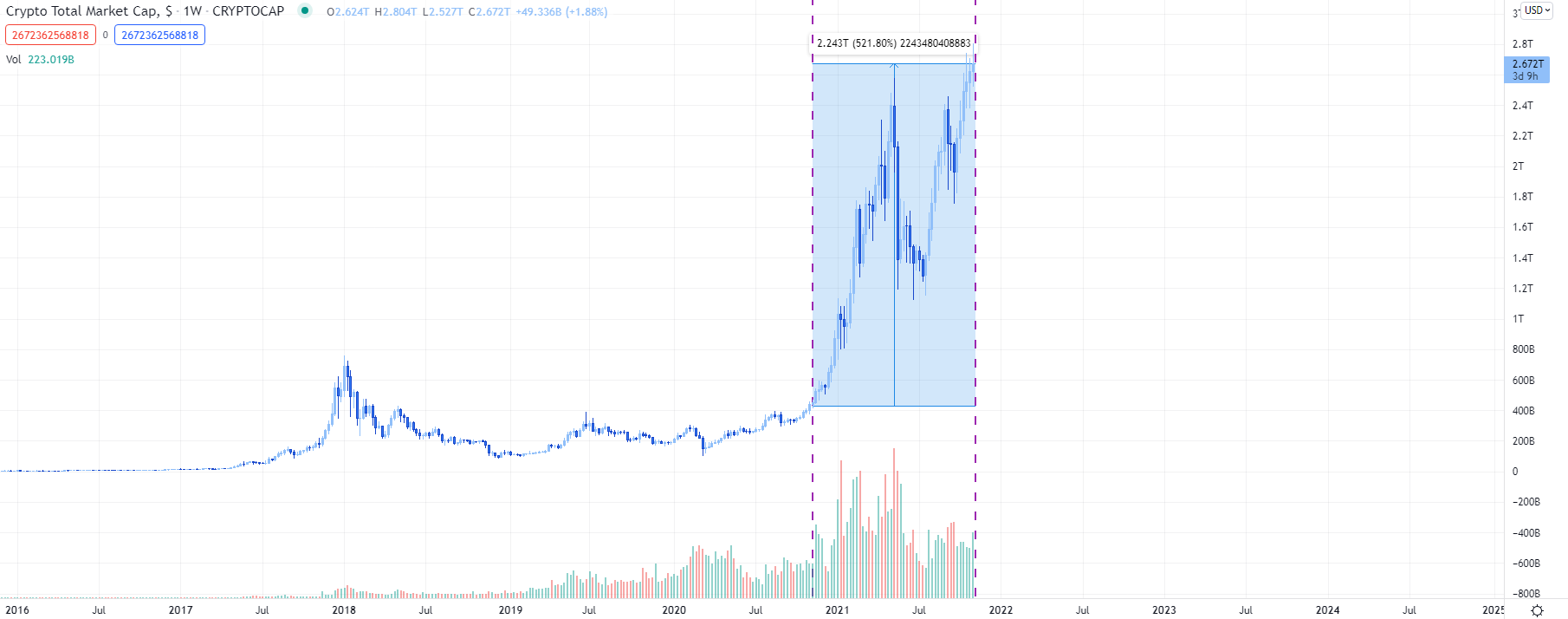Is it finally time for the tech?
Views expressed in the article below are the personal views of the author and should not form the basis for making investment decisions, nor be construed as a recommendation or advice to engage in investment transactions.
Who would’ve thought that in the same week that bitcoin reached the R1m mark, it would’ve been alts that stole the show? As BTC lingers in the $62k region, ETH has mounted an incredible surge beyond its May highs, bolstered in part by the network’s recent Altair upgrade. The successful update brings the network yet another step closer to its transition to Proof-of-Stake in the form of Ethereum 2.0. With ETH sitting comfortably above $4,4k, crypto’s second largest token appears primed for its time in the sun (or rather, on the moon, shall we say).
Examining total crypto cap metrics, one would be forgiven for assuming that BTC is leading the current charge, as the market recorded yet another week of growth, rising 3% to a $2,7T valuation – rapidly closing in on the colossal $3T mark. All while BTC remains below May’s $64k resistance, and dominance recedes to 43% – down 4% from late October. To put things in perspective, the market’s valuation totalled $440B in November 2020, representing a YTD gain of almost 600%.
The likes of ETH, SOL, BNB, and DOT continue to wrestle market share from bitcoin’s dominance
Alexa, play Wild World by Cat Stevens
Things are getting even more Meta
With the crypto space already being a largely self-referential echo chamber fueled by memes and encyclopaedias of inside jokes, the emergence of the metaverse narrative in recent months has added another layer of abstraction to the mix. It appears that we’ve finally arrived at a point where fully immersive, virtual decentralised worlds are being entertained as a natural progression of Web 2 as we know it. The idea of Ready Player One-esque environments has long been a controversial theme resigned to the realm of science fiction, but last week’s announcement that Facebook CEO Mark Zuckerberg’s hulking conglomerate would rebrand as Meta has added increased impetus to the movement. Blockchain gaming platforms enjoyed exponential growth in the wake of the announcement, with Decentraland ($MANA) surging 270% in a single week and Sandbox ($SAND) recording similar gains with two weeks of rolling green candles.
Back to reality (somewhat)
Zuckerberg’s second attempt at segueing his brand into the realm of decentralised ownership has been met with similar controversy to the company’s 2019 announcement of its in-house cryptocurrency Libra, which remains unreleased. The latest incarnation of what was once the bleeding-edge of social media technology has been viewed by many crypto natives as an affront to the democratised ethos at the heart of Web 3, especially considering Meta’s acquisition of VR heavyweight Oculus back in 2014. Oculus use currently requires the creation of a Facebook account, positioning the data-collection monolith as a viable contender for a large share of the future paradigm.
However, it’s worth noting that the ambitious use cases featured in Zuckerberg’s announcement video remain in their infancy, possibly requiring a timeline spanning decades to develop the haptic feedback and low latency required for a truly immersive experience. With rigorous development ongoing by crypto projects already in the space, crypto natives are faced with yet another David vs Goliath scenario. Except as things stand, in the midst of a year that has seen crypto lobbyists bring the White House to a brief standstill, and a valuation now three times larger than that of Meta/ Facebook, Zuckerberg’s latest attempt to whitewash a diminishing brand starts to look less like a genuine attempt to meaningfully contribute to a decentralised future, and more like a scramble from the old guard to maintain a semblance of relevance in a blockchain-powered paradigm shift. May the best code win.
TechCrunch




